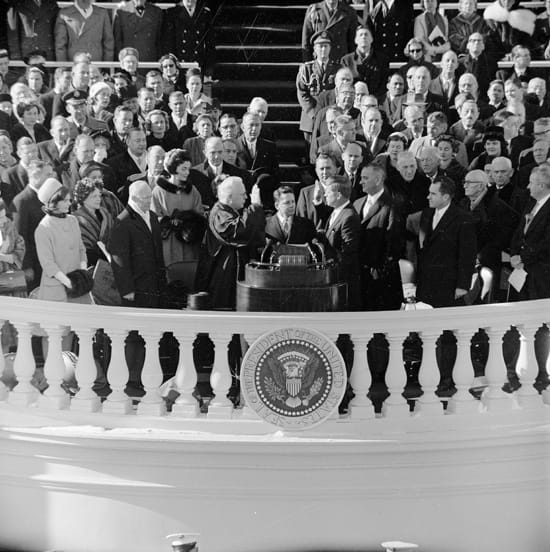inauguration

Our present-day English word inauguration comes from the Latin inauguratio. Augury was the practice of interpreting the behavior of birds as omens. Hence inauguratio connoted the beginning of an endeavor with favorable omens. The Latin noun appears in the writings of Tertullian (c. 155–c. 220 CE), but the word does not appear to have been widely used in classical Latin. It appears in Anglo-Latin c. 1360 in reference to the consecration of a bishop and in 1549 to refer to a university commencement.
The earliest English use that I’m aware was by Scottish theologian John Knox in 1558 in reference to the installation of priests:
Nothing did God reueale particularely to Aaron, but altogither was he commaunded to depend from the mouth of Moses: Yea nothing was he permitted to do to hym self or to his children either in his or theyr inauguration and sanctification to the preesthode, but all was committed to the care of Moses.
By 1569 it was being used in a secular context, that of the coronation of James VI of Scotland (later James I of England) two years prior:
The namis of the Estatis of this realme convenit at Edinburgh in the month of December MDLXVII. quhair our Soverane Lordis coronatioun and inauguratioun in his kingdom was ratyfeit and found gude.
The use of inauguration to refer to the installation of a president of the United States dates to the very first instance, that of George Washington in 1789. A letter from Alexander Hamilton to Washington, dated 5 May 1789, outlines his thoughts on how the newly installed president might avoid implications of favoritism:
The President to accept no invitations: and to give formal entertainments only twice or four times a year on the anniversaries of important events in the revolution. If twice, the day of the declaration of Independence, and that of the inauguration of the President, which completed the organization of the Constitution, to be preferred; if four times, the day of the treaty of alliance with france & that of the definitive treaty with Britain to be added.
Sources:
Campbell, Hugh, ed. “Part of the Early of Murray’s Instructions to Robert Commendatur of Dunfermling, His Ambassador Sent to the English Queen, 15th October, 1569.” In The Love Letters of Mary Queen of Scots to James Earl of Bothwell. London: Longman, et al., 1824, Appendix 59. HathiTrust Digital Archive.
Hamilton, Alexander. Letter to George Washington, 5 May 1789. US National Archives.
Knox, John. The Appellation of Iohn Knoxe from the Cruell and Most Iniust Sentence Pronounced against Him by the False Bishoppes and Clergie of Scotland. Geneva: 1558, 18. ProQuest: Early English Books Online (EEBO).
Latham, Ronald E., David R. Howlett, and Richard K. Ashdowne, eds. Dictionary of Medieval Latin from British Sources. Oxford: British Academy, 2013, s.v. inauguratio, n. Brepols: Database of Latin Dictionaries.
Oxford English Dictionary, second edition, 1989, s.v. inauguration, n.
Lewis, Charlton T. and Charles Short, eds. A Latin Dictionary (1879). Oxford: Oxford UP, 1933, s.v. inauguratio, n. Brepols: Database of Latin Dictionaries.
Photo credit: US government photo, 1961. Wikimedia Commons. https://commons.wikimedia.org/wiki/File:Jfk_inauguration.jpg Public domain image.